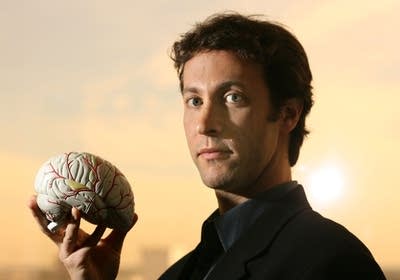Ask a Neuroscientist: Are we born with our political beliefs?

This is the fourth in an occasional series called 'Ask a Neuroscientist.' We're taking audience-submitted questions to David Eagleman, a neuroscientist at Baylor College of Medicine in Houston, to learn more about how the brain works.
Kent: Brains of liberals and conservatives "glow" differently in MRIs as well as those of deeply religious and non-religious people. Is this brain difference from birth, does it develop throughout life, can it be changed?
David Eagleman: So essentially this question is the nature versus nurture question and the answer to the nature versus nurture question is it's a dead question because it's always both. It turns out that you come to the table with the genes that you're dealt - so you've got this enormous genetic inheritance - and this interacts in a very complex way with all of the experiences that you ever have, starting in the womb: The things your mother eats and the chemicals she's ingesting. And then when you're out of the womb every experience you have, the people you interact with, the culture you're embedded in. All of these things then influence your brain development.
So the end product of a brain is an intertwining of genes and environment. And what this means is that brains go off on very different developmental trajectories. Everybody's brain ends up going off on a different pathway. And there's an underappreciated enormous amount of variation between brains. Brains are essentially like fingerprints. We've all got them but they're all quite different actually when you start looking at the details. And this is why we have a society with people who are conservatives and those who are liberals and those who are religious and those who are atheists and so on.
Create a More Connected Minnesota
MPR News is your trusted resource for the news you need. With your support, MPR News brings accessible, courageous journalism and authentic conversation to everyone - free of paywalls and barriers. Your gift makes a difference.
This is all part of, if we can say, Mother Nature's strategy at developing a very rich society. These individual differences are quite important. But in answer to the question that the reader was asking: We can't ever say whether that's nature or nurture. It's both. And as far as whether these things can be changed, you know, sort of.
You probably know from your own experience what it's like to try to talk somebody out of let's say their political opinions. Some people have a little bit more flexibility in terms of what kind of arguments they're willing to listen to and other people don't. So the general story is good luck trying to change somebody.
Tom Weber: While I heard what you said about that it's both, that we're born with it and it changes through life, it seems to me like that in and of itself would lead us to the conclusion that no you're not really necessarily born a liberal or a conservative.
Eagleman: Oh certainly not. No, no certainly not. I mean it doesn't even make sense to think about what that would mean for a child. It would be like saying a child is born as an accountant or an artist. Well, by the time they're going into college, they find themselves attracted to some classes more than others but it probably wouldn't make sense to say that they were born a particular way.
It's that they come to the table with this enormous genetic program, but then everything they experience, whether they get praise or criticism for certain types of tasks, whether they find themselves doing really well at certain things and so on. That all feeds back into the system and changes how they spend their time and what they improve at. So even very little differences at the beginning can get magnified or sometimes it's merely noise at the beginning that gets magnified.
